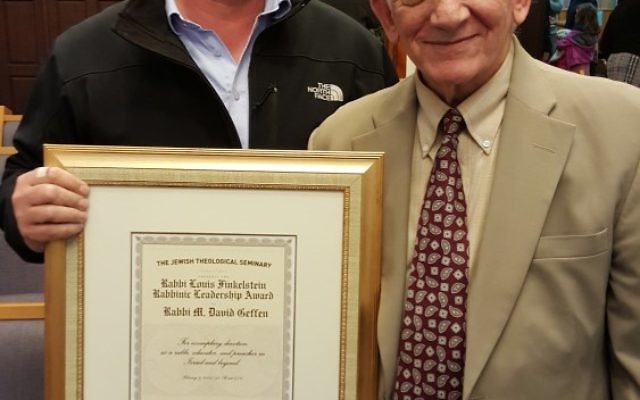Atlanta’s Link to Israel’s Independence
By Rabbi David Geffen
In the late 1940s and early 1950s, I spent a lot of time on Edgewood Avenue. After school I enjoyed going to town to my father’s office. At the end of the working day we drove with my mother from his Five Points office down Edgewood Avenue via Boulevard to 1435 N. Highland near Big Apple and Shackelford Drug.
I plied that route with my folks many times, but only now has the mystery of 154 Edgewood Ave. and Atlanta Jewry’s contribution to the birth of Israel been solved.

Rabbi David Geffen and his oldest son, Avie, who lives in Beit Herut, attend a Jewish Theological Seminary of America event in February.
Arthur Weiss of Carrollton served in World War II. After he finished Temple University, he returned to Atlanta and became the commander of Jewish War Veterans Post 112.
His major role in pre-Israel years was defined by a meeting of Ben-Gurion in New York with American Jewish leaders. “The Pledge” by Leonard Slater recounts the story of how BG stressed that a Jewish state would need armaments of all types to defend itself. Most nations were refusing to help the Yishuv prepare for its military needs. A few years after the Holocaust, the Jews might be slaughtered again when a state came to be.
Arthur Weiss, at 154 Edgewood Ave., was appointed Southeastern coordinator to “collect military clothing and equipment for Palestine fighting forces — in particular compasses, binoculars, and map cases.” Regarding weaponry, shells, even military vehicles and scrap tanks, it was suggested “communities or individuals having large quantities (whatever that might be) were instructed to contact Arthur Weiss for shipping instructions.”
The Southern Israelite noted in May 1948 that “haste is a factor” in these efforts.
My father, active in the JWV and later commander, visited Weiss often, as did many other Atlanta Jews in 1948. Today, it is estimated that over $1 million in World War II weaponry went through Atlanta and was shipped out of Savannah and Charleston, reaching, after a circuitous route, Eretz Yisrael.
Yes, Atlanta Jews and Christians, like Jews and Christians across the United States, did their share. The legendary Ralph McGill, the editor of Atlanta Constitution, who was sent to Palestine by a news agency to get the real story in 1946, aided Palestinian Jews when they came to Atlanta to locate large stockpiles of armaments.
A large advertisement in the May 28, 1948, issue of The Southern Israelite was headed “Close Your Ranks — Jewish Soldiers Are on the March.” The ad showed an Israeli in a shorts uniform with a rifle in his left hand, wearing a Magen David patch on his right arm and pushing a plow.
The tagline stressed, “These Men and Women Need to Know You Are With Them — Stand Up and Be Counted.”
Rabbi Harry Epstein and HaRav Tuvia Geffen knew from the daily Yiddish newspapers they received by mail that a Jewish state would be declared May 14, 1948, as soon as British Mandate forces sailed away. Most of the general U.S. newspapers assumed that Ben-Gurion would wait until Sunday, May 16, after Shabbat, to announce an independent Jewish state.
Today we all know that at noon Friday, May 14, BG read the Declaration of Independence in Tel Aviv because Jerusalem was under siege. After 2,000 years, our state — Israel — came to be. What a Shabbat.
At Congregation Shearith Israel, Rabbi Geffen spoke in Yiddish, a sermon now available in Hebrew and English that has been quoted in the United States and Israel. After a few appropriate sentiments, Rabbi Hyman Friedman led the junior congregation in the moving singing of “Hatikvah.” I was there.
Rabbi Epstein, one of the few Atlanta Jews in 1948 who had visited the Holy Land, had learned in Hebron in the 1920s and received his smicha there. With the flair that only he possessed, he invited a visitor to Atlanta: the Rev. Stanley Grauel of Boston, who was on the ship Exodus. At midnight Saturday (May 15 into May 16), a motzei Shabbat service at Ahavath Achim on Washington Street, open to the community, focused on that special guest.
Elliot Levitas, a Rhodes scholar and former congressman, recently shared his recollections of that night with me. “My most vivid memory was going with my parents to a community meeting at Ahavath Achim, where there was an extensive program with moving ceremonies, music and speakers. Jews and non-Jews packed the house. Emotions ran high. Palpable joy could be felt. At the time I knew that I would never forget the moment.”
Grauel’s impact on Levitas was powerful. “To me, the most impressive speaker was a tall Christian minister who spoke so powerfully that he thrilled the audience. To this day I can hear and feel the delivery of his concluding word, which reverberated through the entire synagogue and brought the crowd to its feet cheering: ‘Yisrael!’ ”
Another specific memory of that night remains for Levitas. “It was a strangely transformative experience. All of a sudden I felt different. There was now, at last, a Jewish state re-established after all these years — sometimes very dark centuries — and I was a Jew living to see it happen.”
He noticed an American flag on the bima. “I felt then such great pride and good fortune in being an American, whose country played a significant role in making this historic moment possible.”
Rabbi David Geffen, a former Atlantan who lives in Jerusalem, is the author of the American Heritage Haggadah, which is found in three American presidential libraries and one Israeli presidential library.




comments